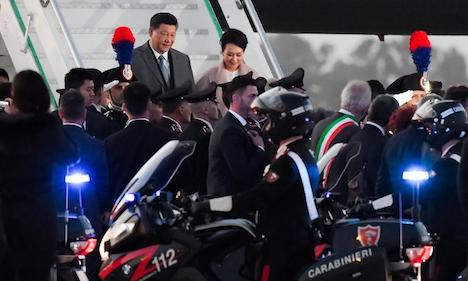|

|
China hysteria falls on deaf ears in Europe
 Print This Print This
By Christopher Scott | Asia Times
Asia Times
Friday, Mar 29, 2019
There is a divide in Brussels about how to approach Beijing, but not about whether to follow the US lead
 |
| China’s President Xi Jinping and his wife Peng Liyuan arrive in Rome for a two-day visit. Photo: AFP / Tiziana Fabi |
As Chinese President Xi Jinping arrived in Italy, headlines alternated between playing up concern in Brussels and trumpeting Rome’s embrace of Beijing’s newfound international swagger.
But Xi’s tour, which will also took him to France to meet with President Emanuel Macron, exposes another tension, beyond that within Europe.
While the continent quibbles with itself about the shape of its integral role in China’s Belt and Road Initiative – which began years before Italy’s decision to endorse the plan was announced last week – the United States anxiously watches its own influence wane.
Hysteria versus caution
“What is happening is that the US is trying to exclude China from a role in world affairs and regional affairs that its economic heft makes almost inevitable,” Chas Freeman, a former US ambassador and former assistant secretary of defense, said in an interview with Asia Times.
Freeman, a specialist in Chinese affairs who was the principal US interpreter on President Richard Nixon’s 1972 visit to China, was referring to Washington’s blanket opposition to China’s growing role through efforts such as the BRI and the Asian Infrastructure Investment Bank.
Following the news last week that Italy was preparing to sign a memorandum of understanding with China and become the first G7 country to officially join the BRI club, the Trump administration’s National Security Council issued a warning.
“Italy is a major global economy and a great investment destination. Endorsing BRI lends legitimacy to China’s predatory approach to investment and will bring no benefits to the Italian people,” the office wrote on its official Twitter account.
At first glance, the Trump administration’s criticism appears to be echoed in other European capitals. The governments in Paris and Berlin have both declined to explicitly endorse the BRI, while some voice concern that Italy is exposing itself to undue Chinese influence.
But Europe’s worries, Freeman noted, are fundamentally different from those of the United States.
“The US is opposed to the Belt and Road Initiative. Brussels wants to temper it and ensure it serves European interests,” he said. “From the US point of view, the objection to Italian outreach to China is just part of hysteria about China that has seized Washington.”
“The US is treating the Belt and Road as a military strategic challenge. The Europeans are treating it as an economic issue that they need to be cautious about.”
Storm in a teacup?
Despite Europe’s rejection of Washington’s China policy, as was on display when the UK and Germany recently refused to block Chinese telecoms giant Huawei from building its next-generation wireless networks, Italy’s embrace of the BRI has stoked real anxiety.
Thus far, Europe’s most enthusiastic participants in the connectivity push included only smaller nations. The prospect of a founding EU country – one that is racked with massive sovereign debt – joining their ranks has raised fears that in the long term it will undermine Europe’s interests by exploiting an unbalanced bilateral relationship.
At the same time there is skepticism about just how significant Italy’s decision will prove to be in the long run.
Wang Huiyao, the president of the Beijing-based think tank Center for China and Globalization, told Asia Times that Italy’s decision could serve to “break the ice.”
“Just like the [Asian Investment Infrastructure Bank] where the first to sign on was the UK and then 97 members joined after that,” Wang said, echoing official sentiment coming from Beijing.
Jonathan Hillman, a senior fellow and specialist on the Belt and Road Initiative at the Center for Strategic and International Studies in Washington, is more circumspect.
Representing the less-than-hysterical end of the spectrum among Washington policy experts, Hillman stressed to Asia Times that the BRI has come up short on substance in many cases and is often “heavy on symbolic gestures and grand statements.”
“Getting an MOU signed is easy. Delivering quality projects is much more difficult. It will take time, and the political winds within Italy could turn against the BRI in the future,” Hillman said.
In many respects, Italy is an outlier among Western European countries. The debate surrounding China will continue as Xi Jinping continues on to Monaco and then France. His interactions with French President Emanuel Macron will in all likelihood stand in contrast to those with Italian leaders more urgently courting Chinese capital.
But Freeman noted that the debate in Europe is not about the Belt and Road.
“The Europeans are scrambling to come to grips with the fact that China’s now a global great power, economically … the debate for them is less about Belt and Road than it is about the terms of Chinese investment and competition in the technology area,” he said
“In the US, there is no debate. There is pretty much an anti-China consensus now.”
Source URL
|
 Print This Print This

|
If you appreciated this article, please consider making a donation to Axis of Logic.
We do not use commercial advertising or corporate funding. We depend solely upon you,
the reader, to continue providing quality news and opinion on world affairs. Donate here
|
 |
World News

|

